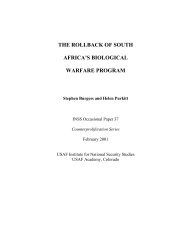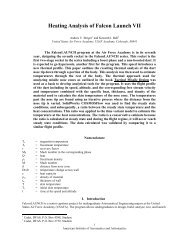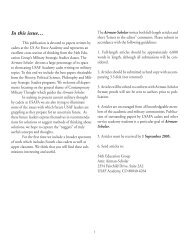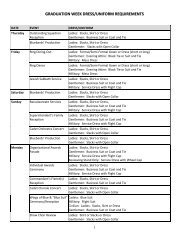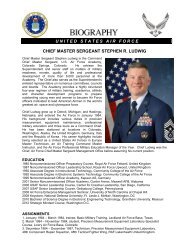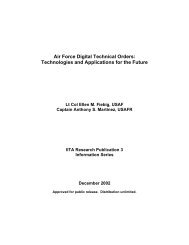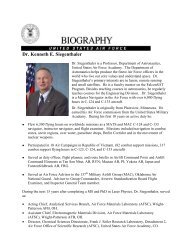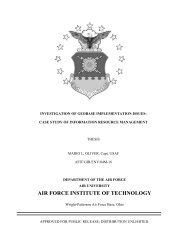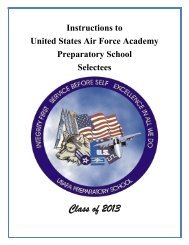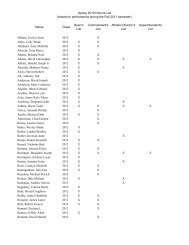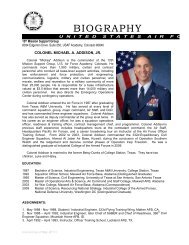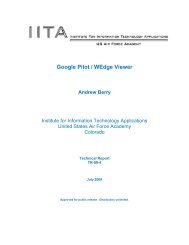Military Professionalism - United States Air Force Academy
Military Professionalism - United States Air Force Academy
Military Professionalism - United States Air Force Academy
Create successful ePaper yourself
Turn your PDF publications into a flip-book with our unique Google optimized e-Paper software.
Messenger, Robert. “Theirs But To Do and Die.” The Weekly Standard 15.48 (Sept.<br />
13, 2010).<br />
http://www.weeklystandard.com/articles/theirs-do-and-die<br />
Marcel Bigeard, who died on June 18 at the age of 94, was a paragon of a new type of<br />
professional warrior that arose during the Cold War. For while the <strong>United</strong> <strong>States</strong> and the<br />
Soviet Union (and their many allies) built large-scale militaries for an eventual hot war,<br />
what came instead were proxy wars in places like Vietnam and the Congo. These did not<br />
require the technology-laden and discipline-heavy units prepared to fight in the Fulda<br />
Gap, but instead small, mobile units of soldiers dedicated to an intense operational tempo.<br />
And they required resourceful officers, able to adapt the methods of guerrillas and willing<br />
to lead by example. Bigeard, who rose from the ranks to four-star general, was such a<br />
soldier: emphasizing physical fitness and endurance, preferring to live rough with his<br />
men, and a master of the topography of battlegrounds. He refused to carry a weapon into<br />
combat, feeling his job was to lead not to fight. (In the U.S. Army, men like Charlie<br />
Beckwith, the founder of Delta <strong>Force</strong>, and Richard Meadows, leader of the Son Tay<br />
Raiders, had similar careers and maintain similar legends.)<br />
Milburn, Andrew R. “Breaking Ranks: Dissent and the <strong>Military</strong> Professional.” Joint<br />
<strong>Force</strong> Quarterly 59 (4 th quarter 2010): 101-107.<br />
http://www.ndu.edu/press/breaking-ranks.html<br />
When faced with a moral dilemma, the military officer not only has grounds for dissent,<br />
but also, if his code of ethics and oath of office so guide, has a duty to disobey. He is<br />
obligated to exercise moral autonomy, and in so doing, must use his professional ethics to<br />
guide him down a path that is by no means clearly defined. Just as civilian leaders have<br />
an obligation to challenge military leaders if the latter appear to be pursuing a strategy<br />
that undermines policy, military leaders are committed to challenge their civilian masters<br />
if the policy appears to be unconstitutional, immoral, or otherwise detrimental to the<br />
military institution. Civilian control of the military does not obviate this obligation and<br />
should not be viewed simply as a unilateral and hierarchical relationship with clear<br />
boundaries. This is especially important now in this era of complex operations that blur<br />
the boundaries between military strategy and policy.<br />
Mileham, Patrick. “Amateurs, Conscripts, Citizens, Professionals. How Do Armed<br />
<strong>Force</strong>s Measure Up?” Defense and Security Analysis (2005): 213-216.<br />
The professionalism of a military force should be judged based on objective control,<br />
military doctrines, force design, relationship with other national institutions, technical<br />
expertise, level of education and training personnel receive, relationship with the civil<br />
population, voluntary service, institutional ethos, internal reciprocal relationships, and the<br />
standards of military ethics. NATO and the EU should strive to raise professional<br />
military standards.<br />
16




